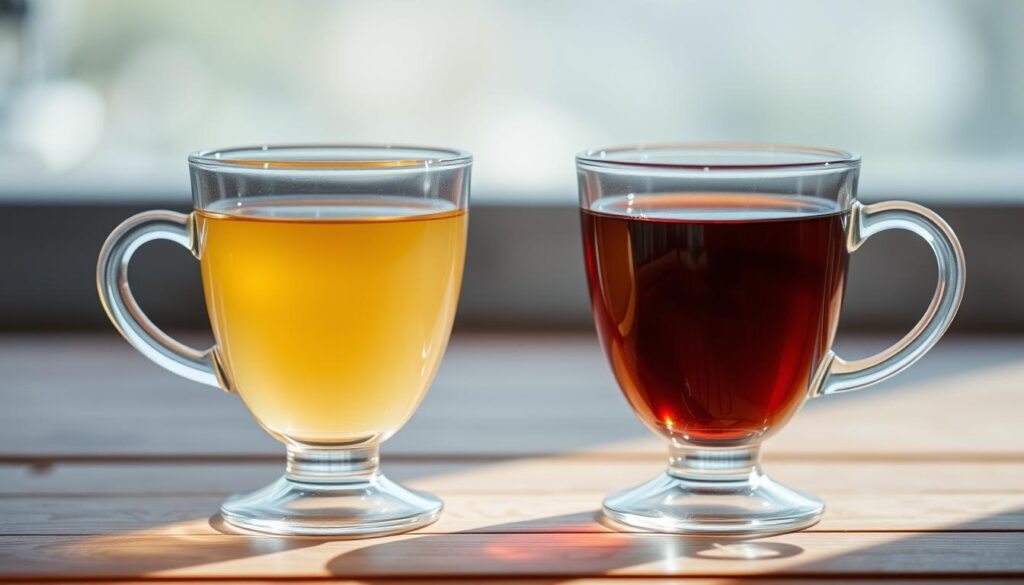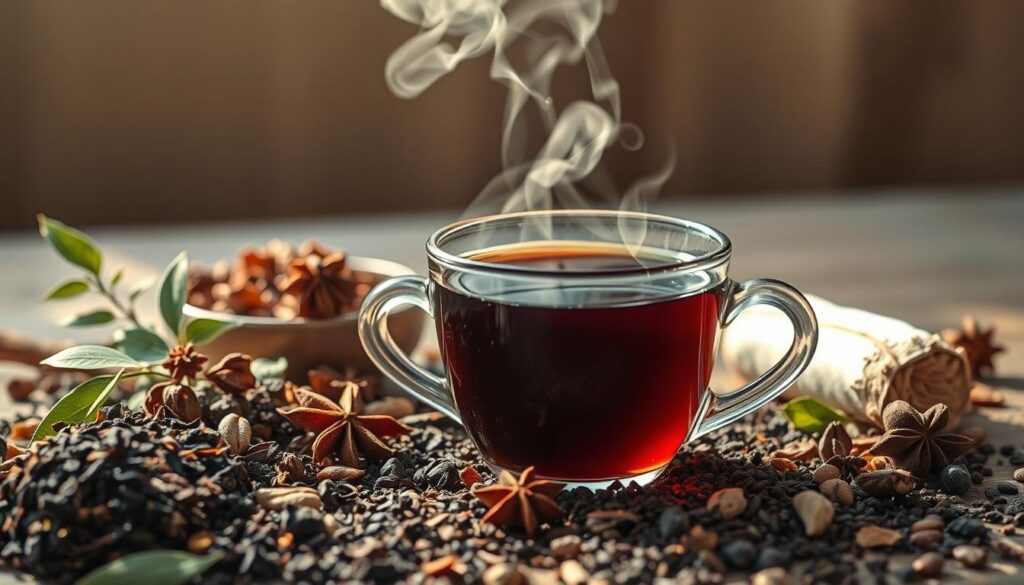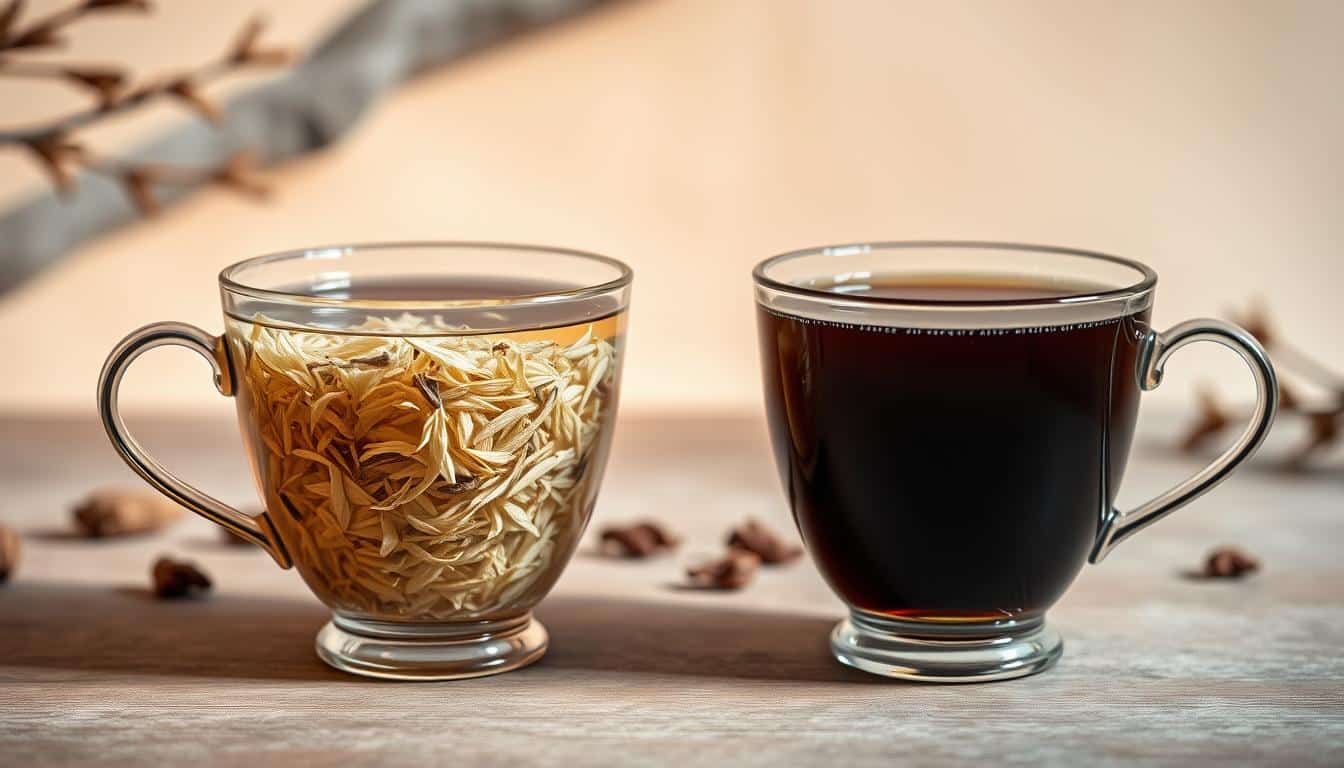“Tea is the elixir of life.” – Lao Tzu
Welcome, dear tea lovers, to an exploration of two beloved brews! ☕️ White tea and black tea come from the Camellia Sinensis plant. They have unique tastes, health benefits, and cultural significance loved worldwide.
In this tea comparison, we’ll look at the differences and similarities between these classic teas. This guide is for both seasoned tea drinkers and newcomers. It aims to deepen your appreciation and help you decide between white tea’s delicate flavors and black tea’s bold charm.
Key Takeaways
- Understanding the origin and processing of white tea vs black tea.
- Diving into the unique flavor profiles of these classic teas.
- Comparing caffeine content for a mindful choice.
- Exploring the distinct health benefits each tea offers.
- Highlighting key differences and similarities to guide your preferences.
Introduction to White Tea and Black Tea
Exploring the world of tea, we discover two main types: white tea and black tea. They come from the same plant, Camellia Sinensis. But, they have different stories, making them special to tea lovers.
White tea is light and gentle. It’s made from the youngest parts of the plant. This tea is barely processed, keeping its natural taste.
Black tea, on the other hand, is strong and full. It gets its bold taste from a longer processing time. This tea is loved for its rich flavor and deep color.
Both teas come from the Camellia Sinensis plant. But, they are different because of how they’re made. White tea is light, while black tea is rich.
These teas show how versatile the Camellia Sinensis plant is. Learning about white and black tea helps us understand their unique tastes and health benefits. Exploring this further, we can see the skill and art in every cup.
Origins and Processing Methods
White and black tea both come from ancient China. White tea was loved by emperors for its soft taste. Black tea won hearts with its strong flavor.
The way they’re made makes them special. Each method adds something unique to the tea.
White Tea Processing
White tea making is simple. The leaves are just dried after picking. This keeps their natural taste and smell.
This method keeps the tea’s true essence. It makes a cup that’s calm and fancy.
Black Tea Processing
Black tea making is different. The leaves are rolled and changed color. This makes the tea strong and lively.
This process makes the tea bold. It also adds to its health benefits. Each sip is a rich experience.
Flavor Profiles and Tasting Notes
Exploring the unique flavors of white and black tea can make drinking tea more fun. Each type has its own special notes, leading you to a world of subtle and rich tastes.
White Tea Flavor
White tea is known for its soft, calming taste. It has a sweet, floral scent like fresh spring flowers. You might also taste a hint of honey, making it a light, dreamy drink.
These notes are great for quiet moments or when you need to relax.
Black Tea Flavor
Black tea, on the other hand, has a strong flavor. It can taste from malty to smoky. Each cup is a bold friend for busy mornings or a cool afternoon pick-me-up.
You might find notes of chocolate, dried fruit, or spices. These add to its bold character. Black tea’s notes are for those who love a strong, exciting taste.
Caffeine Content Comparison
When we look at white tea vs black tea caffeine, we see two different experiences. White tea has about 15-30 mg of caffeine per cup. Black tea, on the other hand, has 47-90 mg per cup. White tea is great for those who want a gentle caffeine boost.
Knowing the tea caffeine content is key for energy and flavor. White tea’s light taste and caffeine work together for a calm alertness. Black tea’s strong taste and caffeine give a bigger energy boost, perfect for mornings.

| Tea Type | Caffeine Content (mg per cup) |
|---|---|
| White Tea | 15-30 mg |
| Black Tea | 47-90 mg |
The caffeine difference affects your energy and how much you enjoy your tea. Do you like the soft boost of white tea or the strong kick of black tea? Your choice changes your tea time every day.
Health Benefits of White Tea
Exploring the white tea health benefits is like finding a treasure chest of wellness. This special drink is full of antioxidants in white tea. These help a lot with keeping you healthy.
White tea is famous for its antioxidants. These fight off free radicals. Free radicals can harm cells and make you age faster. Drinking white tea can make your skin look young and fresh.
But there’s more to white tea! It also helps boost your metabolism. This is great for those trying to lose weight. So, white tea not only tastes good but also helps your body work better.
| Aspect | White Tea Health Benefits |
|---|---|
| Antioxidant Content | High in antioxidants that fight free radicals |
| Skin Health | Supports rejuvenated and vibrant skin |
| Metabolism Boost | Aids in boosting metabolism for weight management |
Adding white tea to our lives can start a journey of wellness. Its antioxidants in white tea improve our health in many ways. Let’s enjoy every sip and discover its endless benefits! 🌱✨
Health Benefits of Black Tea
I’ve always loved the bold taste of black tea. It’s not just tasty; it’s also packed with health perks. This classic tea is a goldmine of benefits.
Black tea is full of antioxidants like flavonoids. These help fight off stress and inflammation in our bodies. Drinking it daily boosts my brain power and keeps me sharp. It’s great for staying focused, whether you’re working on a project or in meetings.
But there’s more. Black tea is also good for your stomach. It makes digestion smoother and can ease stomach pain after eating. This is super helpful after eating heavy foods. Plus, it’s great for your heart. Studies show it can lower cholesterol and improve blood flow, helping your heart stay healthy.

Drinking black tea is more than just a cozy habit. It’s a way to improve your health in many ways. The black tea health benefits go beyond its taste, making a big difference in our well-being.
White Tea vs Black Tea: Key Differences and Similarities
Exploring white tea and black tea shows their unique ways of making, tastes, and health benefits. This comparison helps us see what makes each tea special. It lets us enjoy their unique qualities more.
Let’s look at the main differences and similarities between white tea and black tea:
| Aspect | White Tea | Black Tea |
|---|---|---|
| Processing | Minimally processed, often sun-dried | Fully oxidized, enhancing complexity |
| Flavor Profile | Delicate, subtle, floral notes | Robust, rich, malty flavors |
| Caffeine Content | Lower caffeine levels | Higher caffeine levels |
| Health Benefits | Rich in antioxidants, supports skin health | Boosts heart health, provides energy |
| White Tea vs Black Tea Nutrition | Source of polyphenols, vitamins, and minerals | Contains theaflavins and antioxidants |
Looking at white tea and black tea shows their unique qualities and surprising similarities. Whether you like the soft charm of white tea or the strong taste of black tea, knowing these facts can make your tea time better and healthier.
Conclusion
As we wrap up our exploration of white tea and black tea, we’re amazed by their special qualities. Each one offers a unique taste and health benefits. Whether you love the light, antioxidant-rich white tea or the strong, energizing black tea, every sip is a chance to appreciate tea more.
Deciding between white tea and black tea depends on what you like and what you’re looking for. White tea is great for a calm, light taste with lots of health perks. Black tea, with its bold flavor and easy brewing, is perfect for a boost.
We suggest trying different teas to find your favorite. Knowing about the benefits of each tea helps you choose what suits you best. Let every sip be a moment to relax and live more mindfully. 🍵✨


